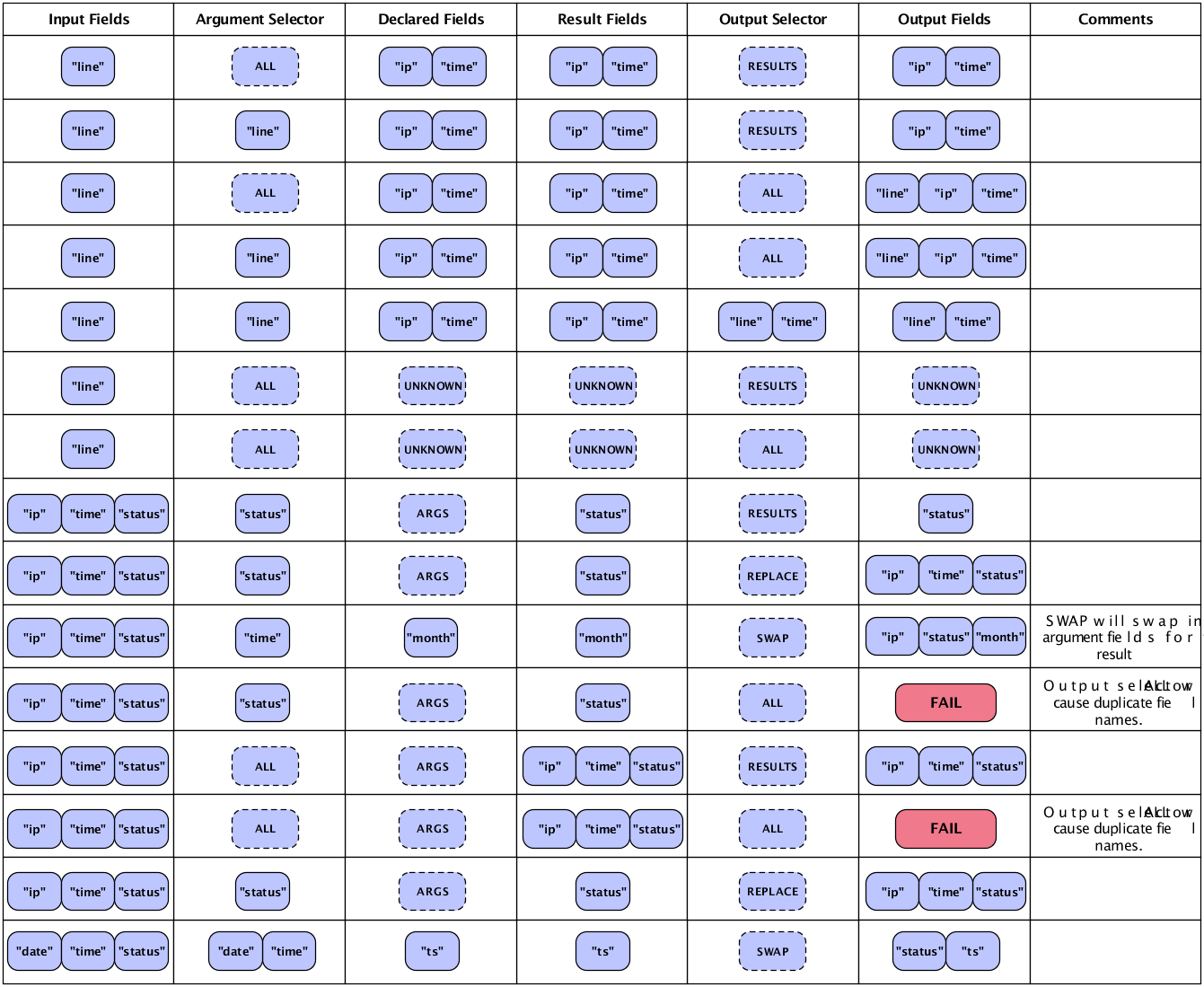Cascading applications can perform complex manipulation or "field
algebra" on the fields stored in tuples, using Fields sets, a feature of the
Fields class that provides a sort of wildcard
tool for referencing sets of field values.
These predefined Fields sets are constant values on the
Fields class. They can be used in many places
where the Fields class is expected. They are:
- Fields.ALL
-
The
cascading.tuple.Fields.ALLconstant is a wildcard that represents all the current available fields.// incoming -> first, last, age String expression = "first + \" \" + last"; Fields fields = new Fields( "full" ); ExpressionFunction full = new ExpressionFunction( fields, expression, String.class ); assembly = new Each( assembly, new Fields( "first", "last" ), full, Fields.ALL ); // outgoing -> first, last, age, full
- Fields.RESULTS
-
The
cascading.tuple.Fields.RESULTSconstant is used to represent the field names of the current operations return values. This Fields set may only be used as an output selector on a pipe, causing the pipe to output a tuple containing the operation results.// incoming -> first, last, age String expression = "first + \" \" + last"; Fields fields = new Fields( "full" ); ExpressionFunction full = new ExpressionFunction( fields, expression, String.class ); Fields firstLast = new Fields( "first", "last" ); assembly = new Each( assembly, firstLast, full, Fields.RESULTS ); // outgoing -> full
- Fields.REPLACE
-
The
cascading.tuple.Fields.REPLACEconstant is used as an output selector to inline-replace values in the incoming tuple with the results of an operation. This convenient Fields set allows operations to overwrite the value stored in the specified field. The current operation must either specify the identical argument selector field names used by the pipe, or use theARGSFields set.// incoming -> first, last, age // coerce to int Identity function = new Identity( Fields.ARGS, Integer.class ); Fields age = new Fields( "age" ); assembly = new Each( assembly, age, function, Fields.REPLACE ); // outgoing -> first, last, age
- Fields.SWAP
-
The
cascading.tuple.Fields.SWAPconstant is used as an output selector to swap the operation arguments with its results. Neither the argument and result field names, nor the size, need to be the same. This is useful for when the operation arguments are no longer necessary and the result Fields and values should be appended to the remainder of the input field names and Tuple.// incoming -> first, last, age String expression = "first + \" \" + last"; Fields fields = new Fields( "full" ); ExpressionFunction full = new ExpressionFunction( fields, expression, String.class ); Fields firstLast = new Fields( "first", "last" ); assembly = new Each( assembly, firstLast, full, Fields.SWAP ); // outgoing -> age, full
- Fields.ARGS
-
The
cascading.tuple.Fields.ARGSconstant is used to let a given operation inherit the field names of its argument Tuple. This Fields set is a convenience and is typically used when the Pipe output selector isRESULTSorREPLACE. It is specifically used by the Identity Function when coercing values from Strings to primitive types.// incoming -> first, last, age // coerce to int Identity function = new Identity( Fields.ARGS, Integer.class ); Fields age = new Fields( "age" ); assembly = new Each( assembly, age, function, Fields.REPLACE ); // outgoing -> first, last, age
- Fields.GROUP
-
The
cascading.tuple.Fields.GROUPconstant represents all the fields used as grouping key in the most recent grouping. If no previous grouping exists in the pipe assembly,GROUPrepresents all the current field names.// incoming -> first, last, age assembly = new GroupBy( assembly, new Fields( "first", "last" ) ); FieldJoiner full = new FieldJoiner( new Fields( "full" ), " " ); assembly = new Each( assembly, Fields.GROUP, full, Fields.ALL ); // outgoing -> first, last, age, full
- Fields.VALUES
-
The
cascading.tuple.Fields.VALUESconstant represents all the fields not used as grouping fields in a previous Group. That is, if you have fields "a", "b", and "c", and group on "a",Fields.VALUESwill resolve to "b" and "c".// incoming -> first, last, age assembly = new GroupBy( assembly, new Fields( "age" ) ); FieldJoiner full = new FieldJoiner( new Fields( "full" ), " " ); assembly = new Each( assembly, Fields.VALUES, full, Fields.ALL ); // outgoing -> first, last, age, full
- Fields.UNKNOWN
-
The
cascading.tuple.Fields.UNKNOWNconstant is used when Fields must be declared, but it's not known how many fields or what their names are. This allows for processing tuples of arbitrary length from an input source or some operation. Use this Fields set with caution.// incoming -> line RegexSplitter function = new RegexSplitter( Fields.UNKNOWN, "\t" ); Fields fields = new Fields( "line" ); assembly = new Each( assembly, fields, function, Fields.RESULTS ); // outgoing -> unknown
- Fields.NONE
-
The
cascading.tuple.Fields.NONEconstant is used to specify no fields. Typically used as an argument selector for Operations that do not process any Tuples, likecascading.operation.Insert.// incoming -> first, last, age Insert constant = new Insert( new Fields( "zip" ), "77373" ); assembly = new Each( assembly, Fields.NONE, constant, Fields.ALL ); // outgoing -> first, last, age, zip
The chart below shows common ways to merge input and
result fields for the desired output fields. A few minutes with this
chart may help clarify the discussion of fields, tuples, and pipes. Also
see Each and Every Pipes for details on the different columns
and their relationships to the Each and
Every pipes and Functions, Aggregators, and
Buffers.
